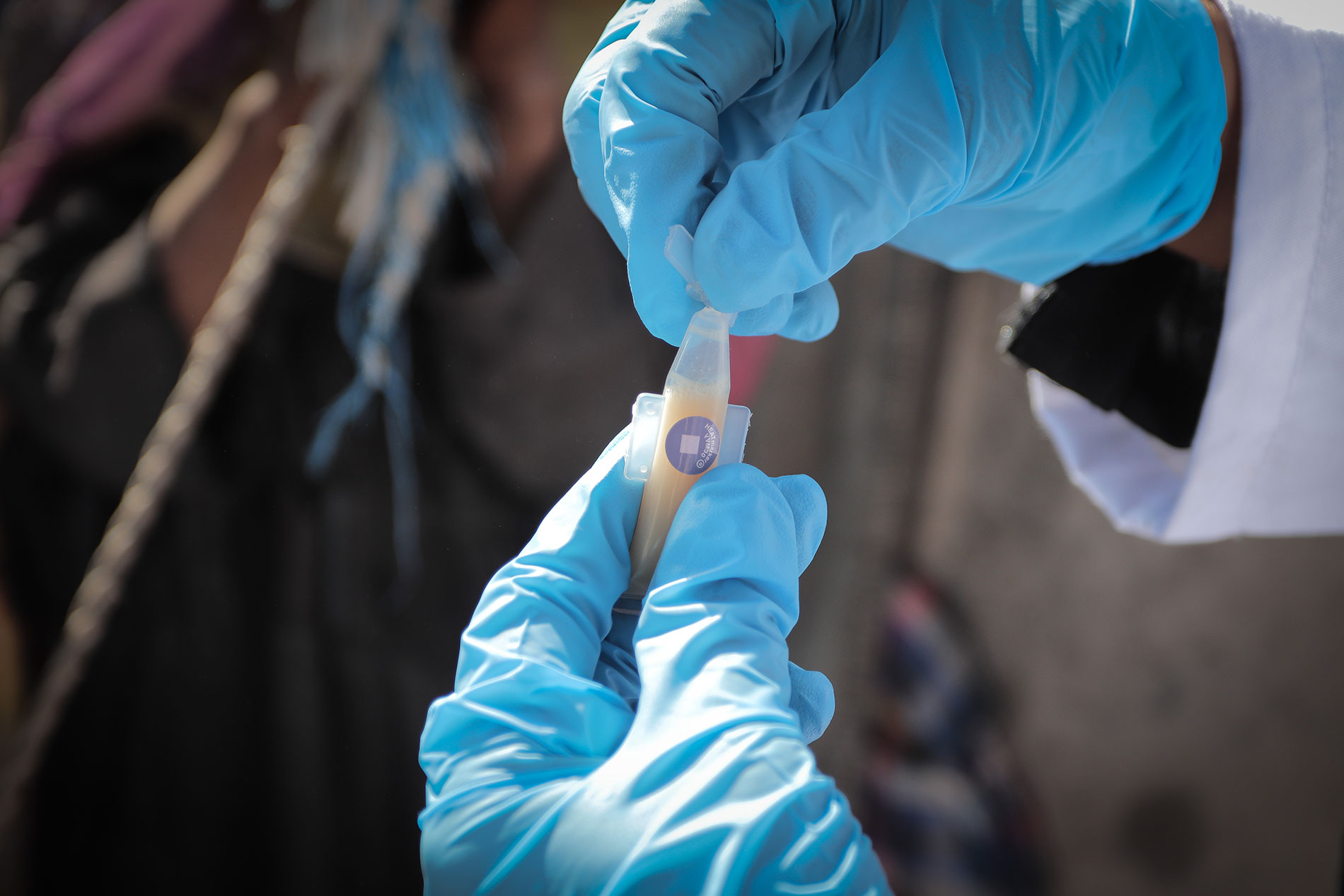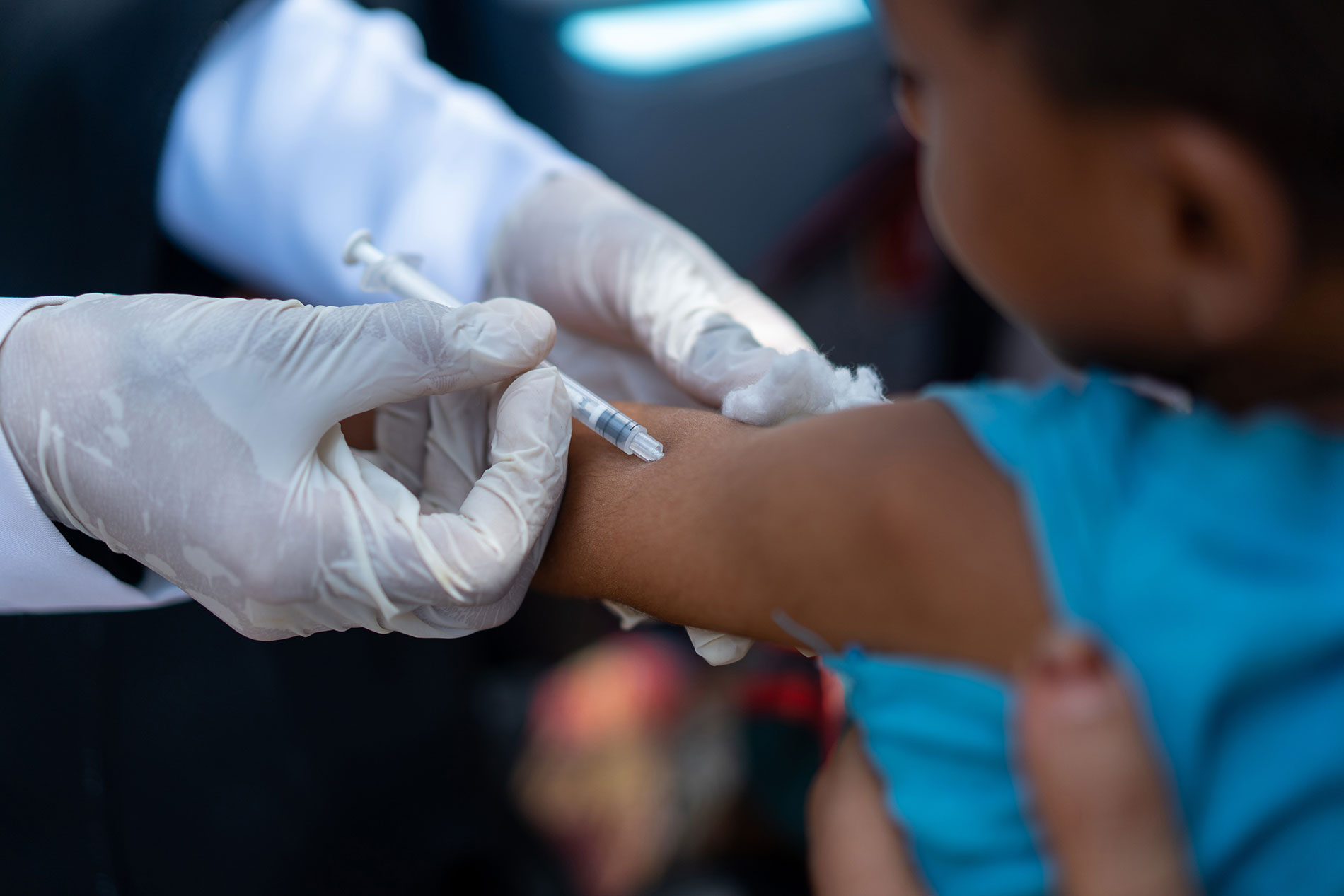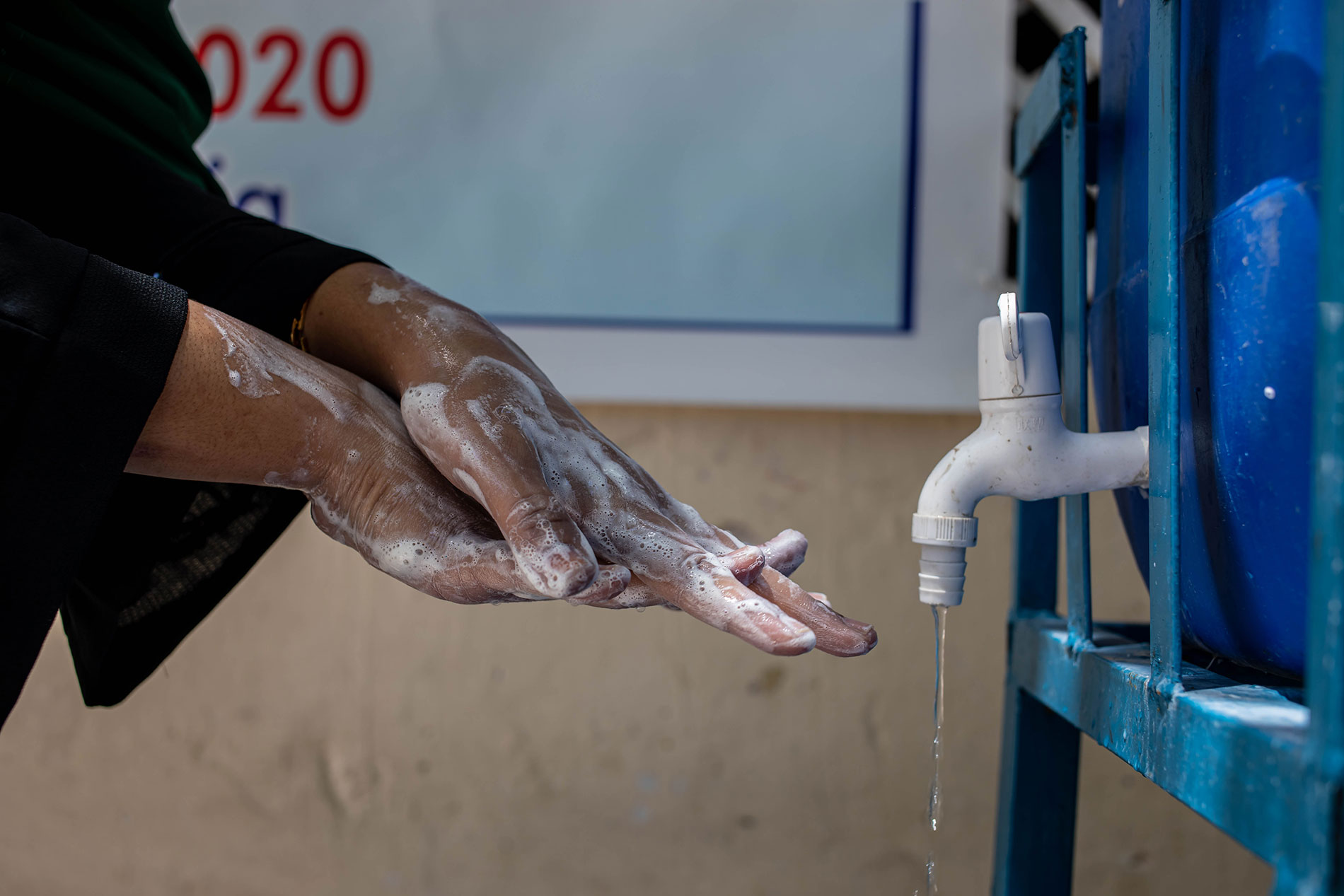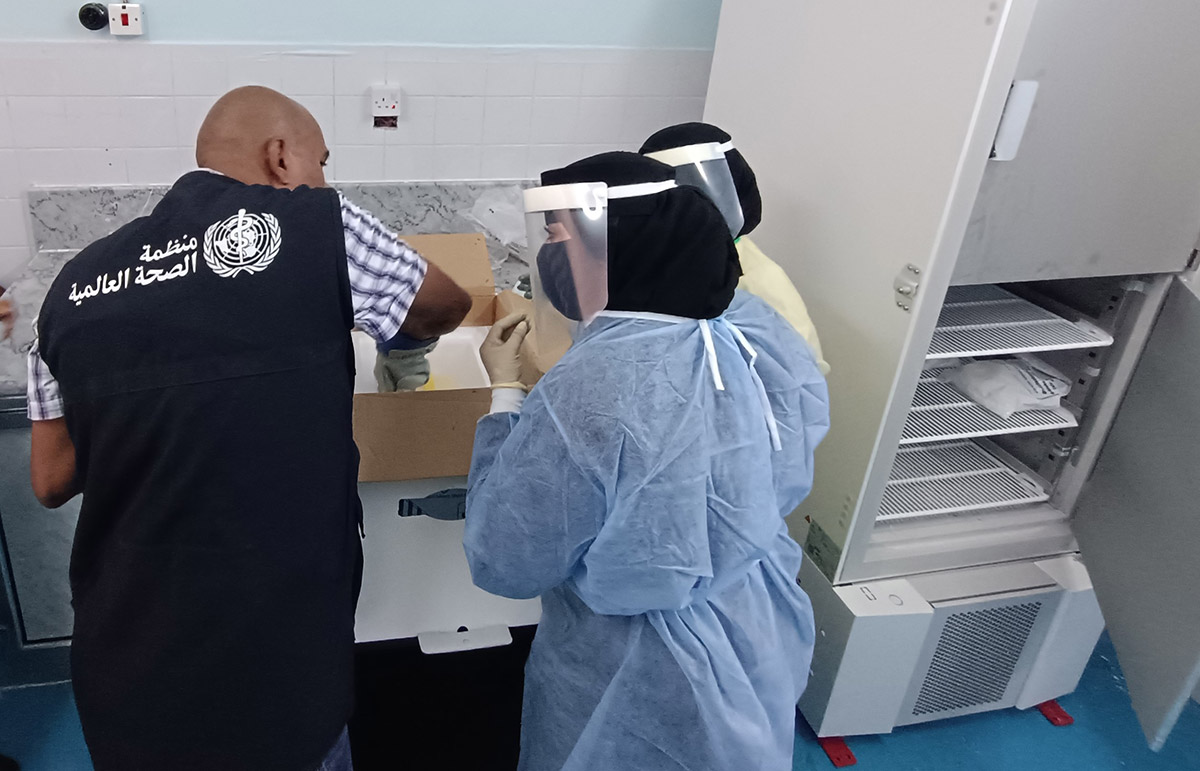WHO launches urgent AWD response project in Yemen amid escalating outbreak
 30 July 2024, Aden, Yemen – A vital response project to combat Yemen’s rapidly escalating outbreak of acute watery diarrhea (AWD) has been launched by WHO, in collaboration with Yemen’s Ministry of Public Health and Population. The project is generously funded by the King Salman Humanitarian Aid and Relief Centre (KSrelief).
30 July 2024, Aden, Yemen – A vital response project to combat Yemen’s rapidly escalating outbreak of acute watery diarrhea (AWD) has been launched by WHO, in collaboration with Yemen’s Ministry of Public Health and Population. The project is generously funded by the King Salman Humanitarian Aid and Relief Centre (KSrelief).
Since mid-March 2024, Yemen has seen a dramatic surge in AWD cases, with 29 536 suspected cases reported by 25 April 2024. With heavy seasonal rains affecting already fragile water and sanitation systems, each day currently brings 500 to 1000 new cases, making the situation even more urgent.
The 12-month project, costing US$ 3 million, is set to directly benefit more than 4.7 million people and indirectly help a further 520 175 individuals. Through collaborative efforts and strategic interventions, and supported by the KSrelief funding, WHO will work tirelessly to mitigate the crisis and safeguard public health in Yemen.
“This project is a lifeline for Yemen’s health system amid a rapidly escalating situation. Through strategic coordination and targeted interventions, we aim to swiftly detect and confirm AWD cases, improve case management, and prevent further transmission among affected communities,” said Dr Arturo Pesigan, WHO Representative to Yemen.
KSrelief believes that this is an urgent situation that requires direct and swift intervention to combat the outbreak. Through this partnership, we aim to significantly reduce the impact of AWD on communities and strengthen the country’s resilience against health emergencies, ensuring a healthier future for Yemen, stated Dr. Abdullah Al-Muallem, Health and Environmental Aid Department Director
The project focuses on 3 key outcomes: enhancing early AWD detection, improving severe case management, and preventing community transmission. Its intended impact could prove crucial in reducing AWD-related health risks and strengthening Yemen’s ability to handle future health challenges.
Media contacts
WHO Yemen Communications
Email:
About WHO
Since 1948, the World Health Organization (WHO) has been the United Nations agency dedicated to advancing health for all, so that everyone, everywhere can attain the highest level of health. WHO leads global efforts to expand universal health coverage, direct and coordinate the world’s responses to health emergencies and connect nations, partners and people to promote health, keep the world safe and serve the vulnerable.
About KSrelief
The King Salman Humanitarian Aid and Relief Centre (KSrelief) is a humanitarian aid organization established by the Kingdom of Saudi Arabia. KSrelief is dedicated to coordinating and providing international relief to alleviate suffering and provide essential services to those in need.
WHO and KSrelief launch US$ 3 million project to combat vaccine-preventable diseases in Yemen
 30 July 2024, Aden, Yemen – More than 1.2 million people are set to benefit from a vital initiative to combat measles and other vaccine-preventable diseases in Yemen. The US$ 3 million project launched by WHO and the King Salman Humanitarian Aid and Relief Centre (KSrelief) aims to significantly boost immunization coverage and measles surveillance over a 15-month period.
30 July 2024, Aden, Yemen – More than 1.2 million people are set to benefit from a vital initiative to combat measles and other vaccine-preventable diseases in Yemen. The US$ 3 million project launched by WHO and the King Salman Humanitarian Aid and Relief Centre (KSrelief) aims to significantly boost immunization coverage and measles surveillance over a 15-month period.
The project titled “Strengthened Measles Outbreak Response to Reduce Under-Five Child Mortality in Four Governorates in Yemen” targets 1 205 336 beneficiaries across Aden, Hajjah, Saada and Taiz – 4 of the governorates most affected by Yemen’s current measles outbreak. Solar refrigerators will also be provided to 81 health facilities as part of the project, ensuring greater access to vaccination services.
The impact of these efforts will be carefully monitored through strengthened routine surveillance data, with progress visualized via dashboards that track vaccination coverage and surveillance trends.
Yemen has faced recurrent outbreaks of vaccine-preventable diseases, severely affecting health care delivery and increasing humanitarian needs. Destruction of health infrastructure, economic suspension and large-scale displacement have strained the health system – especially in the 4 target governorates, which are home to over 25% of Yemen’s under-five population.
Discriminatory norms and misconceptions about vaccination have led to alarmingly low immunization rates, leaving children vulnerable to diseases such as measles, polio, diphtheria and pertussis.
To address these challenges, the project will be rolled out in 77 districts across the 4 target governorates. The project will involve 770 health facilities and deploy 1540 health workers to ensure regular vaccination throughout its duration.
“This project represents a crucial step towards improving the health and well-being of Yemen’s children. By increasing immunization rates and strengthening surveillance, we can significantly reduce the incidence of vaccine-preventable diseases and protect the most vulnerable populations,” said Dr Arturo Pesigan, WHO Representative to Yemen.
Dr. Abdullah bin Saleh Al-Muallem, Director of the Health and Environmental Aid Department at the center, stated that the project to enhance the response to the measles outbreak aims to reduce child mortality under five years old in four governorates in Yemen. The project seeks to limit the spread of measles through vaccination campaigns in four major governorates where the epidemic has spread. It targets the vaccination of 1,205,336 children through 1,125 health centers where vaccination campaigns will be launched.
The project also includes the purchase of equipment to support the cold chain to ensure sustainable routine immunization services in the selected areas. Additionally, it supports essential activities in the water and environmental sanitation sectors, as these activities play a crucial role in limiting the spread of the epidemic.
Furthermore, the project provides medicines, intravenous solutions, and necessary consumables to treat confirmed cases in all Yemeni governorates. Epidemiological investigation is considered one of the most important essential activities included in the project to ensure verification and timely rapid intervention when measles cases are detected, in addition to transporting samples and supporting laboratory tests.
This partnership between WHO and KSrelief reflects a shared commitment to safeguard the health and well-being of Yemen’s children, reduce the incidence of vaccine-preventable diseases and strengthen the country’s health system.
Media contacts
WHO Yemen Communications
Email:
About WHO
Since 1948, the World Health Organization (WHO) has been the United Nations agency dedicated to advancing health for all, so that everyone, everywhere can attain the highest level of health. WHO leads global efforts to expand universal health coverage, direct and coordinate the world’s responses to health emergencies and connect nations, partners and people to promote health, keep the world safe and serve the vulnerable.
About KSrelief
The King Salman Humanitarian Aid and Relief Centre (KSrelief) is a humanitarian aid organization established by the Kingdom of Saudi Arabia. KSrelief is dedicated to coordinating and providing international relief to alleviate suffering and provide essential services to those in need.
WHO and KSrelief launch US$ 3.75 million project to improve WASH services in Yemen’s health facilities
 30 July 2024, Aden, Yemen – A US$ 3.75 million project is set to enhance the water supply and water, sanitation and hygiene (WASH) services in Yemen’s health facilities. WHO and the King Salman Humanitarian Aid and Relief Centre (KSrelief) are launching the project to target the most vulnerable populations across the country.
30 July 2024, Aden, Yemen – A US$ 3.75 million project is set to enhance the water supply and water, sanitation and hygiene (WASH) services in Yemen’s health facilities. WHO and the King Salman Humanitarian Aid and Relief Centre (KSrelief) are launching the project to target the most vulnerable populations across the country.
Titled “Improved WASH Services in Healthcare Facilities with Sustainable Water Supply to Serve the Most Vulnerable Populations in Yemen”, the project aligns strategic objectives of Yemen’s Humanitarian Response Plan 2024 and priorities of the WASH Cluster and Health Cluster.
Focusing on life-saving support for internally displaced people and vulnerable groups, the project will improve health care for 580 231 beneficiaries. It will do so by enabling 10 health facilities to sustain safe water, maintaining water services in 60 other facilities and upgrading WASH infrastructure in 2 hospitals, benefiting newborns, maternal health, and disease prevention. WHO will ensure safe water supply, infection prevention and control, and water quality monitoring as part of the project to safeguard health services.
“This project is a critical step towards reducing morbidity and mortality from preventable illnesses among the Yemeni population. By improving WASH services in health facilities, we not only ensure the safety of health workers and patients but also increase patient satisfaction with the services provided,” said Dr Arturo Pesigan, WHO Representative to Yemen.
KSrelief remains dedicated to supporting initiatives that directly impact vulnerable communities in Yemen. This project’s focus on sustainable water supply and enhanced WASH services in health facilities will significantly improve service delivery and address critical health challenges, stated Dr. Abdullah Al-Muallem, Health and Environmental Aid Department Director.
This project underscores the collaborative efforts of WHO and KSrelief in serving the most vulnerable populations in Yemen and ensuring their access to essential health services.
Media contacts
WHO Yemen Communications
Email:
About WHO
Since 1948, the World Health Organization (WHO) has been the United Nations agency dedicated to advancing health for all, so that everyone, everywhere can attain the highest level of health. WHO leads global efforts to expand universal health coverage, direct and coordinate the world’s responses to health emergencies and connect nations, partners and people to promote health, keep the world safe and serve the vulnerable.
About KSrelief
The King Salman Humanitarian Aid and Relief Centre (KSrelief) is a humanitarian aid organization established by the Kingdom of Saudi Arabia. KSrelief is dedicated to coordinating and providing international relief to alleviate suffering and provide essential services to those in need.
Yemen begins sharing seasonal influenza viruses with WHO Collaborating Centre in London
 Shipment process under way on 13 May 2024 at CPHL in Aden, Yemen. Photo credit: WHO/K. Mayas8 July 2024 – Influenza virus sharing is essential to prepare the world against pandemics. Virus sharing also enables the development of candidate vaccine viruses, surveillance for resistance to antiviral medicines, and revision of diagnostic reagents and test kits.
Shipment process under way on 13 May 2024 at CPHL in Aden, Yemen. Photo credit: WHO/K. Mayas8 July 2024 – Influenza virus sharing is essential to prepare the world against pandemics. Virus sharing also enables the development of candidate vaccine viruses, surveillance for resistance to antiviral medicines, and revision of diagnostic reagents and test kits.
Owing to the ongoing conflict in Yemen, the country has been unable to share virus samples every year with the WHO Collaborating Centers under the Global Influenza Surveillance and Response System (GISRS). On 14 May 2024, Yemen succeeded for the first time in shipping the first 50 samples of seasonal influenza viruses to the WHO Collaborating Centre for Reference and Research on Influenza in London.
During the H1N1 pandemic in 2009, Yemen’s Ministry of Public Health and Population designated the Central Public Health Laboratories (CPHL) as the National Influenza Centre. Following the COVID-19 emergency, Yemen has adapted its respiratory disease surveillance system to monitor both influenza and SARS-CoV-2 viruses. This was done with support from WHO headquarters and the WHO Regional Office for the Eastern Mediterranean.
Since then, Yemen has been expanding its services for the subtyping of influenza and other respiratory viruses to feed into this new national integrated surveillance programme and GISRS.
Headquarters and Regional Office experts arranged a mission to Yemen in March 2022 in coordination with the WHO Country Office in Yemen. The mission’s aims were to reactivate influenza sentinel sites, which had been suspended during the COVID-19 emergency; train Ministry of Public Health and Population and CPHL staff on virus testing and on sharing influenza viruses with human pandemic potential, as per the Pandemic Influenza Preparedness Framework; and to ensure that CPHL has met the WHO requirements for testing procedures for respiratory viruses.
As of January 2023, samples are being collected at influenza sentinel sites. They are then shipped to the CPHL’s governorate-level National Centre for confirmation by polymerase chain reaction (PCR) test. The next step should be to share confirmed samples with the WHO Collaborating Centre in London. Logistics have, however, prevented this until May 2024.
Dry ice, needed to ship samples internationally, has been unavailable in Yemen since 2015 owing to the war and an embargo. With support and facilitation from WHO, however, dry ice was received in Aden from Addis Ababa, Ethiopia. This was transported via a United Nations Humanitarian Air Service flight from Addis Ababa to Aden; the same plane then took the packaged samples on to Amman, Jordan. The samples made the last leg of their journey, from Amman to London, via international courier.
The same coordination mechanism will be used for future shipments of influenza virus samples until Yemen is able to produce dry ice.


